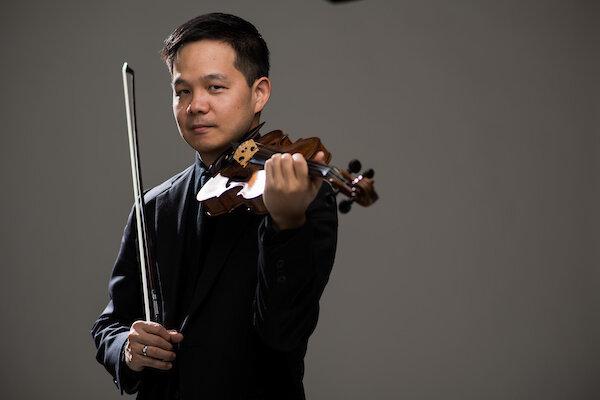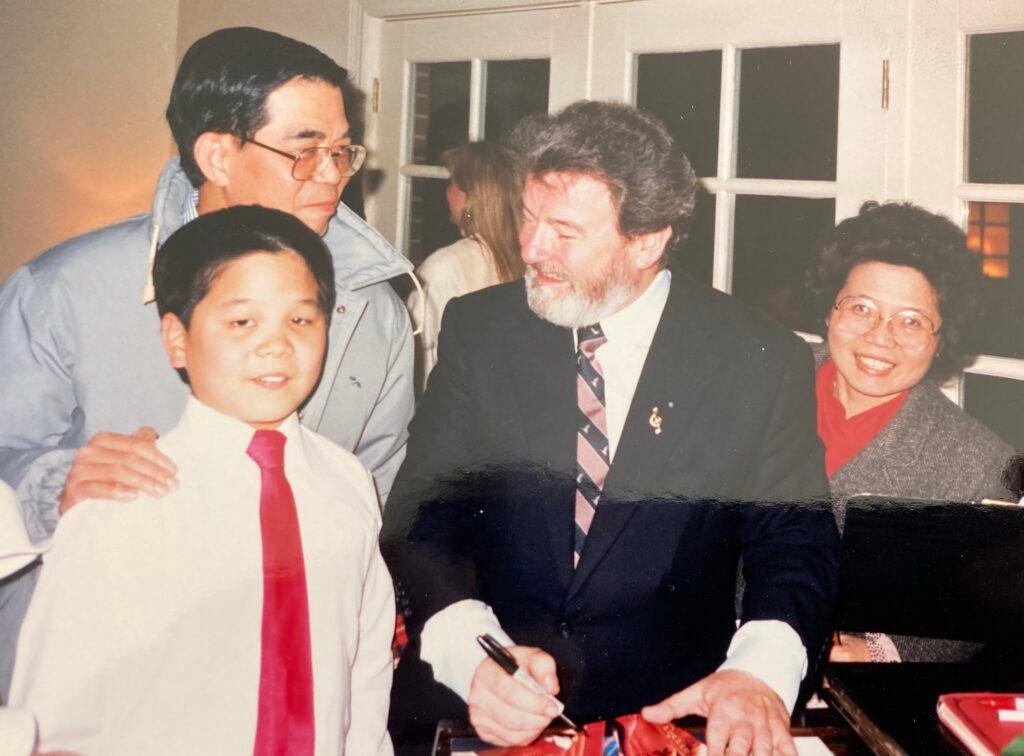
Violinist Claude Sim was appointed associate concertmaster of the Colorado Symphony at the age of 21. Beyond his early success as an orchestra member, he won the grand prize at the Fischoff National Chamber Music Competition and has served as an educator at colleges throughout Colorado. His interests go beyond classical; he's passionate about jazz, argentine tango and rock projects, too.
Read more about Claude Sim's start in music and and what Asian American and Pacific Islander Heritage Month means to him.
CPR: Can you tell me about your heritage?
CS: My heritage is Chinese-American, though I've always identified simply as American. AAPI month is a welcome celebration of inclusivity and cultural contribution, especially during these challenging times.
CPR: What was your start in music? Age, instrument, people who inspired you?
CS: I started on both piano and violin at age three. Growing up in the northern suburbs of Chicago, I obsessively listened to a lot of music that inspired me. From delta blues to hard rock, bluegrass to jazz, anything was fair game for me. I picked up the mandolin after hearing Bill Monroe, and I played electric bass in my high school jazz band after hearing Jaco Pastorius on a Weather Report album. I’m certain it was the wide range of genres that I immersed myself in that made me the musician that I am today. The most inspirational figure in my childhood was the basketball legend Michael Jordan. I admired his fierce work ethic and ability to lead and inspire his team to discover their full potential. To this day, I find parallels between great sports teams and music ensembles.
CPR: Has a career in music been your dream since the very beginning? If not, how did it become your career?
CS: I never looked at music as a potential career. For me, music is something that I can’t live without. I sincerely believe there is no such thing as a backup plan or fall back option if you are serious about music. My parents were certainly worried about the practicalities of a life in music for me, but they were incredibly supportive which was key.

CPR: 50 years ago, we hardly saw any diversity in classical music - gender, race, etc. How has the orchestral world changed in terms of diversity and is there more that needs to be done? Would love to know if you personally have or have not seen a change during your career.
CS: Through my journey teaching in higher education and performing professionally, only recently has there been a notable spotlight on the diversity issue in classical music. From the composers that we present, to the diversity of membership within the orchestra itself, the classical symphonic world is a reflection of opportunity, education and access. I’m proud to work with the Colorado Symphony where several of our key principal musicians are women. We’ve certainly made progress on equity over the past years but of course have much work to do.
CPR: What does AAPI month mean to you?
CS: When thinking about what AAPI month means to me, I reflect on my parents' journey. My father was born in Hong Kong and came to America in search of opportunity through education. He attended college in Kirksville, MO. There, he met my mother, a piano student from Taiwan who had decided to study music in the United States. Their story is remarkable to me, considering they both fulfilled their American dreams with little resources but full hearts. To make ends meet, my father waited tables. He eventually found further opportunity working in a mailroom and eventually became head librarian of the Wood Library Museum, the resource center of the American Society of Anesthesiologists. My mother worked customer support for the Interlocal Pension Fund. Their shared love of classical music meant that I was exposed to the arts from an early age. I'll never forget listening to WFMT and the classical music constantly playing in my parents' car on the way to piano/violin lessons. The deep voice of Karl Haas and that beautiful Beethoven Sonata intro to the show left a mark on me. This love of music led me to pursue a career in music, heading to Oberlin Conservatory for a performance degree, and eventually landed me a leadership position with the Colorado Symphony. When I think of the incredible privilege of this position that I still occupy today, it all goes back to my immigrant parents and their determination to contribute positively to American culture and society.
My dad spoke frequently about the so-called "melting pot" of America where our differences, varying perspectives and unique experiences make our country stronger. He spoke with gratitude every day about this land of opportunity. Without this American ideal, I don't believe I could have had the opportunities that I've enjoyed. My parents undoubtedly paved the way for me to have a chance at success. To me, AAPI month celebrates and recognizes the contributions of Asians, but more broadly highlights all people that wish to come to our country with dreams of a better future.
CPR: We want to hear a shout out from you! What piece, performer, composer, do you think we should look to to celebrate AAPI month, and why?
The Chinese composer Huang Ruo comes to my mind during AAPI month. We were classmates at Oberlin Conservatory back in the day, and his Angel Island Oratorio project is very interesting. Through a musical format, his work documents the struggle of Asian immigrants that faced massive discrimination via the Chinese Exclusion Act in 1882. Undoubtedly a dark chapter in our history, works like this are important to spotlight to raise awareness and ultimately improve ourselves and society.
There are a variety of ways to hear great performances by today’s top artists as well as legendary singers from the Metropolitan Opera’s history. Download the Colorado Public Radio app, tune in at radio signals around Colorado, or you can tell your smart speaker to “Play CPR Classical."









